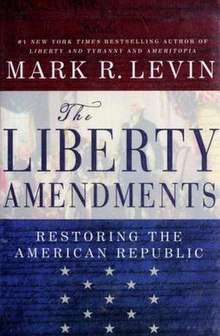The Liberty Amendments
The Liberty Amendments: Restoring the American Republic is a book by the American talk radio host and lawyer Mark Levin, published in 2013.[1] In it, Levin lays out and makes a case for eleven Constitutional amendments which he believes would restore the Constitution’s chief components: federalism, republicanism, and limited government.[2]
 | |
| Author | Mark Levin |
|---|---|
| Country | United States |
| Language | English |
| Publisher | Simon & Schuster |
Publication date | August 13, 2013 |
| Media type | Print (Hardback), paperback, Kindle, Audio |
| Pages | 272 (Hardcover) |
| ISBN | 1451606273 |
Summary
The eleven amendments proposed by Levin:[3][4]
- Impose Congressional term limits
- Repeal the Seventeenth Amendment, returning the election of Senators to state legislatures
- Impose term limits for Supreme Court Justices and restrict judicial review
- Require a balanced budget and limit federal spending and taxation
- Define a deadline to file taxes (one day before the next federal election)
- Subject federal departments and bureaucratic regulations to periodic reauthorization and review
- Create a more specific definition of the Commerce Clause
- Limit eminent domain powers
- Allow states to more easily amend the Constitution by bypassing Congress
- Create a process where two-thirds of the states can nullify federal laws
- Require photo ID to vote and limit early voting
Levin would have these amendments proposed to the states by a convention of the states as described in Article Five of the Constitution.
Effects if implemented
These amendments would entrench a hard Right-libertarianism political structure. The Federal Government & Supreme Court would be greatly diminished in power, and State power over Federal law greatly increased.
Repealing the 17th Amendment and ending Senate elections, on the assumption that any State Legislature will send 2 members of the same political party that controls it, would change the current 116th United States Congress composition of 53 Republican, 2 Independent and 45 Democratic members to 62 Republican and 38 Democratic members. Once the two existing Democratic leaning Independents (Bernie Sanders and Angus King) left the Senate, it would be unlikely for any independent or third party senator to ever gain a position while the two major parties still existed. The repeal would return the election of Senators to the original Constitutional method as devised by the founding fathers, which empowers State governments to check issues at the Federal level (e.g. unfunded Federal mandates) since Senators would be beholden to the State Legislatures, not the electorate at large. It would also heighten the importance of internal State elections even further as those would determine who picked their US Senators.
The majority of the amendments would be a direct constitutional mandate of Republican party Small government policy at a federal level. They would also provide a useful defensive bulwark against Democratic party control of the Federal government apparatus, and potentially a way to impose Republican policy on Democratic party state governments.
The balanced budget and departmental reauthorizing amendments would necessarily entail a massive reduction in Government spending, when combined with the Republican control of the now vastly empowered State Governments, these budget cuts would likely come out of Federal government areas that Republican party policy is to cut such as welfare, education, health, science.
Requirements for photo ID & limiting early voting are a controversial topic in the United States that splits along party lines. Such laws are generally opposed by the Democratic party as such laws disenfranchise poor & minority voters who have trouble accessing photo ID, or may be required to work on election day but are banned or highly discouraged by their employers. Opponents believe that Republican party policy is in favor specifically because it disenfranchises those poor & minority voters that increasingly vote against their party, and that the viewpoint that it combats what they believe is large scale electoral fraud, despite no proof that such widespread fraud exists, is a smokescreen and a piece of anti-immigrant, anti-minority Dog-whistle politics.
Giving State Governments the ability to veto or bypass a Supreme Court decision would effectively result in a power similar to that of amending the Constitution itself being handed directly to the States, without the existing requirements to call for a Constitutional convention.
Reception
The book debuted at #1 on The New York Times Best Seller list in all three categories for which it qualified.[5]
See also
References
- von Spakovsky, Hans (September 4, 2013). "Amendments for Liberty". National Review. Retrieved March 24, 2014.
- Gutzman, Kevin (September 27, 2013). "Do We Need a New Constitutional Convention?". The American Conservative. Retrieved March 24, 2014.
- Horowitz, Daniel (August 13, 2013). "Mark Levin's Liberty Amendments". RedState.com. Retrieved July 4, 2014.
- Jacobson, William (August 12, 2013). "The Liberty Amendments – Mark Levin's Constitutional Sequester". Legal Insurrection. Retrieved July 4, 2014.
- Smith, Kyle (September 1, 2013). "Why are major media outlets ignoring bestselling writer Mark R. Levin?". New York Post. Retrieved March 24, 2014.